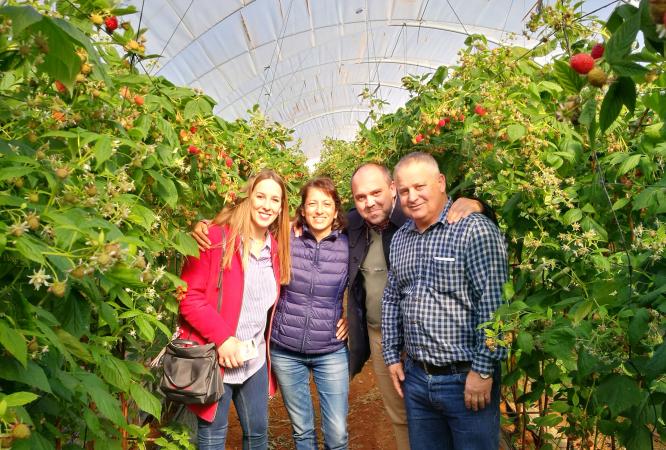 Last June I visited our Haifa North West Europe team members in Poland: Greg Peszko Sales Manager & Janusz Wysowski HNWE Agronomist.
Last June I visited our Haifa North West Europe team members in Poland: Greg Peszko Sales Manager & Janusz Wysowski HNWE Agronomist.During my visit Greg & Janusz took me to see growers (Orchard, Greenhouse, Nurseries and Open Field) with different growing methods that are using Haifa Group products and are very satisfied. We visited 5 regions met the growers, seen their different machinery & approach and visited our distributor warehouse. The regions we've visited:
Radom area which is in east-central Poland , Kalisz in central Poland which is high tech greenhouses area, Grudziadz and Toruń region which are located in northern Poland on the Vistula River and Grójec which surroundings are considered to be the biggest apple-growing area of Poland.

In Poland there is a great big market which is evolving and is highly professional when it comes to growing vegetables in greenhouses / polytunnels and fruit tree orchards. The loss of the Russian market in 2014, incentivized Polish apple growers to diversify varieties in their orchards. Polish growers continue to look for new export destinations. The apple and pear market is very high in production and currently Poland is a leading apple producer in the European Union (EU) and accounts for almost 30 percent of total EU production.

The growers are transforming from rainfall application to advanced means such as drip irrigation. It's very important for the growers to use more advanced technology when applying water soluble fertilizers in order to increase water use efficiency and resilience in irrigation that brings positive outcomes. To help growers' receive successful results, our Haifa experts are getting more involved in guiding growers in their "playground", demonstrating them how to apply fertilizers the right way, how to approach to different stages of the plant.
First stop was in Radom, where we met a grower who grows peppers in polytunnel is, a tunnel which is made from steel and covered in polythene. The interior heats up because incoming solar radiation from the sun warms plants, soil, and other things inside the building faster than heat can escape the structure. Air warmed by the heat from hot interior surfaces is retained in the building by the roof and wall. Temperature, humidity and ventilation can be controlled by equipment fixed in the polytunnel or by manual opening and closing of vents.

These peppers were planted on 26.04.2018.
The grower uses Poly-Feed 18-18-18 + Calcium nitrate at vegetative grow, Poly-Feed 9-10-38 + Calcium nitrate from fruit set. Fertigation plan for each week including weather and growing conditions changes. pH+EC checkings. Peppers grow in monoculture - over a dozen years in the same soil. Monoculture is widely used in both industrial farming and organic farming and has allowed increased efficiency in planting and harvest Soil diseases and excessive salinity are a common problem.


On the left picture you can see the peppers in the polytunnel, on the right Janusz & the grower

on the left picture you can see the salinity problem in the crops, the first two rows on the left (partly on the third row). Salinity is one of the most brutal environmental factors limiting the productivity of crop plants because most of the crop plants are sensitive to salinity caused by high concentrations of salts in the soil, and the area of land affected by it is increasing day by day.
In winter time the soil is covered so no natural rinsing occured.
On my second blog of my visit - "Visit to Poland (Part II)", I will show growers we've met, the challenges that are a head and the innovation technology for the evovling market - greenhouses .




